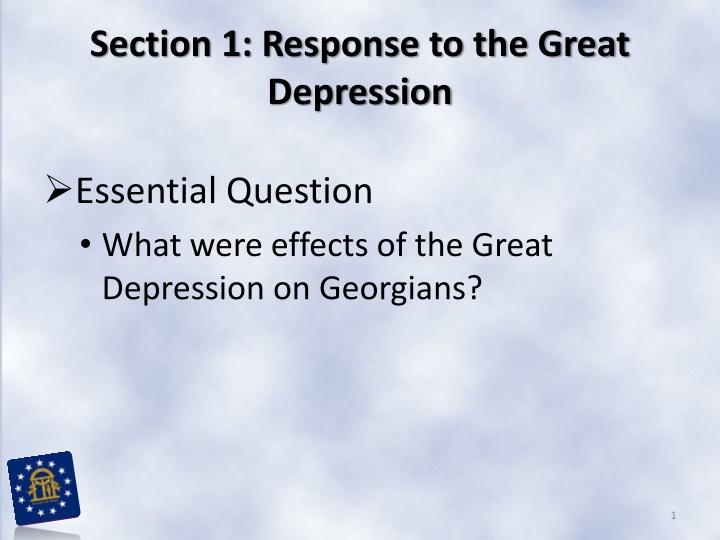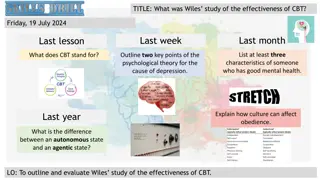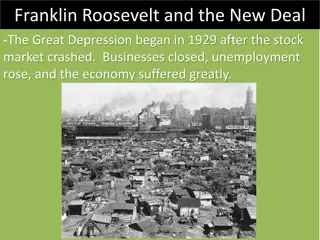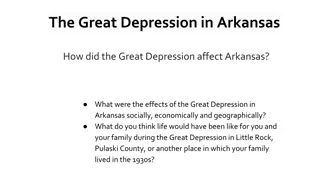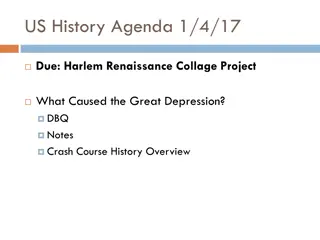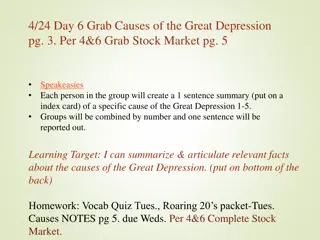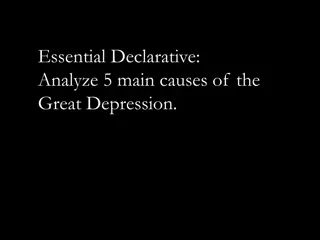Effects of the Great Depression on Georgians: A Historical Perspective
The Great Depression had profound effects on Georgians, leading to growing unemployment, bank failures, and loss of homes and farms. President Franklin Roosevelt's New Deal brought hope for improvement. Life in Depression Georgia saw contrasts, as some businesses thrived while many workers and farmers suffered, leading to increased homelessness and reliance on assistance programs. The Election of 1932 marked a significant turning point with FDR's victory and his promise of bold experimentation through the New Deal.
Download Presentation

Please find below an Image/Link to download the presentation.
The content on the website is provided AS IS for your information and personal use only. It may not be sold, licensed, or shared on other websites without obtaining consent from the author.If you encounter any issues during the download, it is possible that the publisher has removed the file from their server.
You are allowed to download the files provided on this website for personal or commercial use, subject to the condition that they are used lawfully. All files are the property of their respective owners.
The content on the website is provided AS IS for your information and personal use only. It may not be sold, licensed, or shared on other websites without obtaining consent from the author.
E N D
Presentation Transcript
Section 1: Response to the Great Depression Essential Question What were effects of the Great Depression on Georgians? 1
Section 1: Response to the Great Depression What terms do I need to know? barter 2
Response to the Great Depression After the 1929 stock market crash, America experienced a growing unemployment rate and many bank and business failures. Many citizens lost their homes and farms. President Franklin Roosevelt s election in 1932 marked the beginning of changes in the relationship between the American economy and its government. Roosevelt termed his programs of change the New Deal. Georgians hoped the changes would improve their lives. 4
Life in Depression Georgia Some Georgia companies profited in the 1930s, including Coca-Cola and Stuckey s, which sold pecan candies. Many factory workers became unemployed and homeless as were many farmers who lost their homes and farms. Atlanta became home for many escaping from the countryside, leading to more overcrowding in the poor areas. Soup kitchens, the Salvation Army, and churches tried to feed the hungry. Community Chest organizations raised funds, which were quickly used up. In Atlanta, a program was set up to put people to work for goods or food instead of money. The unemployment rate was twice as high for blacks as for whites. Many families had so little cash that they bartered goods rather than using cash. 5
Ownership versus Tenancy by Georgia Farmers: 1920-1950 350,000 300,000 250,000 Number of Farmers 200,000 Black owners Black tenants White owners 150,000 White tenants 100,000 50,000 0 1920 1925 1930 1935 Year 1940 1945 1950 6
The Election of 1932 Democrat Franklin Delano Roosevelt (FDR) campaigned on the promise of the New Deal. FDR had visited Warm Springs for several years for treatment of polio. He considered himself an adopted Georgian. Roosevelt said in a speech in Atlanta that the country needed bold, persistent experimentation. Roosevelt defeated incumbent President Herbert Hoover, and won all of the southern states in the 1932 election. Link: Little White House 7
